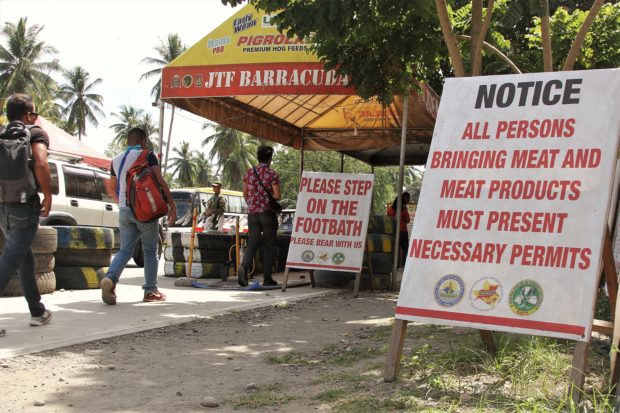
PROTOCOL Passengers from other places step on a footbath at a military checkpoint in Barangay Tinagacan, General Santos City.
MALITA, DAVAO OCCIDENTAL—Gov. Claude Bautista has ordered the culling of what remained of the 100,000 hogs in the province, following the African swine fever (ASF) outbreak that killed thousands of pigs in Don Marcelino town last week.
The culling started on Wednesday with the 7,000 remaining live hogs in Don Marcelino, the ground zero of the outbreak, where some 6,000 pigs were reported to have died due to ASF.
Don Marcelino Mayor Michael Maruya said they buried the dead pigs near a cemetery in Barangay Poblacion but would have to look for another site if the present one could not accommodate all the pigs.
Bautista had tasked village officials with collecting the remaining hogs to be culled, saying all owners would be paid P5,000 per head.
But swine deaths had already spread to the neighboring towns of Sta. Maria, Jose Abad Santos and the capital town of Malita. The provincial government carried out a 24-hour quarantine checkpoint and warned hog raisers against slaughtering or roasting their pigs.
1-7-10 protocol
Nilo Provido Jr., spokesperson of the Department of Agriculture (DA) in Davao region, reminded officials to strictly enforce the 1-7-10 protocol, which means, to disinfect the place within the 1-kilometer radius from ground zero, restrict all animal movements within the 7-km radius, and implement control and surveillance zone within the 10-km radius.
“We will control and conduct close monitoring inspection then we will have testing, prioritizing those which show clinical signs of ASF infestation,” Provido told the Inquirer by phone.
Davao City cases
Barely three days after Davao City Mayor Sara Duterte banned pigs and pork meat from Davao Occidental, the Bureau of Animal Industry confirmed that the ASF had caused the death of some pigs in two villages in Calinan district in the city.
As a result, city officials ordered a lockdown of Calinan district, according to Ricardo Oñate, the DA regional director.
Esther Cherrie Rayos, assistant city veterinarian, said her office had taken samples from the initial 26 pigs which died in two Calinan villages in January for diagnosis.
Rayos also said the city had stopped all animal movement in the affected villages.
On Monday, Duterte included Davao del Sur in the entry ban on pigs and pork products because of reports of suspected cases there and after thousands of hogs had died were in Don Marcelino.
“I will no longer wait for confirmation, I will include Davao del Sur in the ban,” the mayor said.
Loss of livelihood
But Davao del Sur Gov. Douglas Cagas said the province remained ASF-free. He said he had adopted stringent measures to stop a possible entry of infected pigs in his province.
In Davao del Sur’s boundary town of Sulop, which shares a border with Davao Occidental, authorities closed down the auction site for livestock to avoid the entry of contaminated pigs there.
Hog raisers and vendors in Don Marcelino expressed concern over the loss of their livelihood, especially when school expenses were expected to mount because of the graduation season.
Evangeline, 45, a hog raiser and vendor, said she would have a hard time coping with the mounting expenses for her son who would be graduating in March. She surrendered her 700 hogs to the provincial government after a meeting with Bautista on Tuesday.
Another vendor, Lucila, 48, said she did not know where to get the money to buy her medical maintenance medicine after the provincial government ordered them to stop selling pork meat, her main source of income.
Aside from the fear of losing his capital, George Manumping, a hog raiser, said he was averse to killing his hogs because he also felt mercy for the animals.
Interest-free loans
In Barangay Lapuan in Don Marcelino, Gemma, a villa council member, said they saw 100 pigs die as early as the second week of January but thought nothing about it.
Agriculture Secretary William Dar, who visited the province on Sunday, offered government loans to hog raisers to tide them over. He said the DA had an emergency program that allows a hog raiser to get a P30,000 loan with no interest and payable within three years.
“But we suggest that they should not invest it in hog raising [immediately] because of the presence of ASF,” he said, urging them to go into goat farming instead or any other venture.
Pork ban
Bautista said a contingency plan had been set to contain the virus in the next six months.
In Davao del Sur, the provincial government also ordered a ban on the entry of pigs and pork products.
In Koronadal City, South Cotabato province, at least 40 hogs were buried on Tuesday after the animals showed symptoms of ASF infection, a city official said.
Koronadal City and Sulop town in Davao del Sur are only 137 km apart.
Following the reported ASF infection in Koronadal, South Cotabato Gov. Reynaldo Tamayo Jr. directed all town mayors to take appropriate preventive measures.
Mayor Dibu Tuan of T’boli town ordered a lockdown to stop the entry of live pigs and pork meat. The local government of Tampakan town in South Cotabato, which is adjacent to Davao del Sur, also imposed a temporary lockdown.
Cotabato Gov. Nancy Catamco also formed a task force to prevent the entry of infected pigs. Cotabato hosts more than 200,000 hogs in 17 towns and one city, according to Dr. Rufino Sorupia, provincial veterinarian.
Soldiers tapped
In Zamboanga City, soldiers trained in combat are now mandated to and inspect vehicles ferrying infected pigs. “We are not just trained in fighting war. Our troops now are trained to ensure that no pork meat or hog with ASF enters the city,” said Col. John Divinagracia, commander of Joint Task Force Zamboanga.—REPORTS FROM ORLANDO DINOY, EDWIN FERNANDEZ, ELDIE AGUIRRE, JULIE ALIPALA AND GERMELINA LACORTE